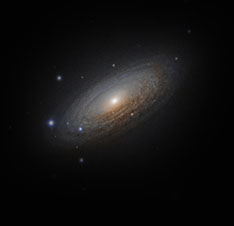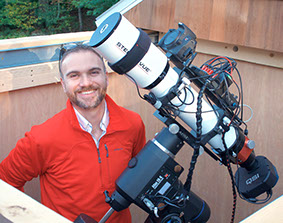
About Me
 I have always been captivated by the sciences, particularly by the process of science - a process by which we uncover the endless and unexpected truths of the natural world. Early on, I gravitated towards the life sciences and focused my attention on the science of the very small. I attended Penn State University earning a Bachelor’s degree in Microbiology with a minor in Biochemistry and Molecular Biology. While there, I conducted research in genetic engineering and studied blood cell formation and disease. Afterwards, I attended the University of Massachusetts Medical School where I earned a Doctoral degree specializing in Molecular Medicine. My research focus during, and since, deals with the study of animal virus proteins that possess the ability to destroy cancer cells (more on this can be found on my lab website). I am currently an Associate Professor of Biochemistry at the Worcester Polytechnic Institute where I continue my research and mentor students in Chemistry and Biochemistry.
I have always been captivated by the sciences, particularly by the process of science - a process by which we uncover the endless and unexpected truths of the natural world. Early on, I gravitated towards the life sciences and focused my attention on the science of the very small. I attended Penn State University earning a Bachelor’s degree in Microbiology with a minor in Biochemistry and Molecular Biology. While there, I conducted research in genetic engineering and studied blood cell formation and disease. Afterwards, I attended the University of Massachusetts Medical School where I earned a Doctoral degree specializing in Molecular Medicine. My research focus during, and since, deals with the study of animal virus proteins that possess the ability to destroy cancer cells (more on this can be found on my lab website). I am currently an Associate Professor of Biochemistry at the Worcester Polytechnic Institute where I continue my research and mentor students in Chemistry and Biochemistry.
Although I have always been interested in many other aspects of science (and science fiction for that matter), my interests in astronomy did not flourish until recently. I spent a lot of time in my childhood looking at the moon and stars through my brother’s Tasco refractor, making sketches of moon craters and trying to learn their names. My astronomy pursuits didn’t mature beyond that for a while (if you discount the extensive Star Trek and Star Wars education of a generation-X nerd). A few years ago my wife gifted me a small computerized Celestron newtonian that reinvigorated those pursuits as well as started a new one in astrophotography (a decision she likely regrets - see Gear page).
Of all that one gains by devoting even the most meager amount of attention to the stars, I believe it is perspective that constitutes the most impactful, relevant, and essential outcome. Given the myriad of societal and political themes playing out across the globe, it is perspective that stands to bring congruity to these diverse cultures, ideals, and agendas. I often wonder what fraction of the Earth’s human inhabitants ever look up at the night sky … and think.
© 2022 D. Heilman